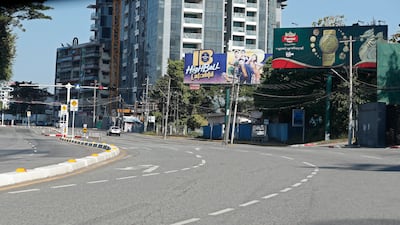The United States on Monday recognised the ethnic cleansing of Myanmar’s Rohingya Muslim minority at the hands of the military as a genocide.
Secretary of State Antony Blinken announced the genocide designation during remarks at the Holocaust Memorial Museum in Washington.
“I’ve determined that members of the Burmese military committed genocide and crimes against humanity against Rohingya,” said Mr Blinken.
“It’s a decision I reached based on reviewing a factual assessment and legal analysis prepared by the State Department, which included detailed documentation by a range of independent, impartial sources.”
Mr Blinken also announced an additional $1 million in US funding for the UN independent investigation mechanism for Myanmar.
The US has also shared information with The Gambia to aid the West African country's case against Myanmar in the International Criminal Court.
In December last year, during a visit to Malaysia, Mr Blinken said the US was looking "very actively" at whether the treatment of the Rohingya might "constitute genocide".
The US State Department released a report in 2018 that described violence against the Rohingya in western Rakhine state as "extreme, large-scale, widespread, and seemingly geared towards both terrorising the population and driving out the Rohingya residents".
"I'll never forget the painful stories I heard in 2017 from members of the Rohingya community in Burma and Bangladesh - stories of violence and crimes against humanity," US senator from Oregon Jeff Merkley write on Twitter on Sunday about news of the genocide designation.
"Good to see the admin take this overdue step to hold this brutal regime accountable, which I've pushed for years," he said.
About 850,000 Rohingya are languishing in camps in neighbouring Bangladesh, having fled mass killings and sexual violence, while another 600,000 members of the community remain in Rakhine where they report widespread oppression.
A genocide designation could result in additional human rights-related sanctions on Myanmar’s ruling military junta.
The US slapped a series of sanctions on the country's leaders and, like other western nations, has long restricted supplies of weapons to its armed forces, which even before the junta took power faced allegations of crimes against humanity for the brutal campaign against the Rohingya.
The case opened against Myanmar by The Gambia at the International Court of Justice in 2019 has been complicated by last year's coup that ousted civilian leader Aung San Suu Kyi and her government, triggering mass protests and a bloody crackdown.
The Nobel peace laureate, who faced criticism from rights groups for her involvement in the Rohingya case, is now under house arrest and on trial by the same generals she defended at The Hague.
The administration of former president Barack Obama had pumped large amounts of political capital into Myanmar's transition to a fledgling democracy, offering financial help and diplomatic support.
But the US also made clear its discomfort at continuing violence between Myanmar's army and ethnic rebels as well as religious violence and discriminatory policies aimed at the Rohingya.
Agencies contributed to this report.















